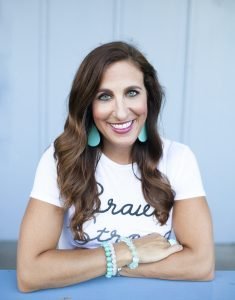Last updated on October 27, 2022
Gia Storms, founder of Storms Coaching & Consulting in Los Angeles, shares with us her story of transitioning from a corporate career to being her own boss. We hope you enjoy this interview!
Coaching Focus: My coaching inspires clients to imagine their best lives and courageously take the action needed to make it happen. I push clients to shorten the distance between dreaming and doing, arming them with the tools and techniques to create meaningful, swift change in all areas of their lives. My clients are leaders craving balance and meaning, creatives looking to take their careers to the next level, and managers seeking tools to overcome resistance, build inclusive teams and make change happen now.
Location: Los Angeles, California, USA
Connect: You can find Gia online at her website, as well as on Instagram and Facebook. Plus, find her leadership courses on Udemy and her writing at Harvard Business Review.
Editor’s Note: Don’t miss Gia’s article here at Life Coach Magazine: What to Do If You’re in the Wrong Job.
Tell us about your journey as a coach.
Nine years ago, when I was first introduced to coaching, I was rocked by a deep and instant calling to help individuals and teams connect with their best selves.
But I dismissed it repeatedly in favor of more “serious” pursuits, determined to keep climbing the corporate ladder and earn my stripes in a more traditional setting.
When I finally moved out of New York City and its relentless ambitious churn five years ago, I found myself in Los Angeles and ready to officially hang up my corporate, media, and government hats to seek new professional development opportunities and career paths.

As the open landscape of California’s start-up culture worked its way into my psyche and an opportunity to re-examine coaching presented itself, I jumped at it, and have been thrilled and delighted answering the call to my life’s work ever since. Now it’s my turn to help others connect to their own calls to adventure, to their deep purpose and essential self.
What advice or perspective might you give to a new coach trying to get their first clients? Any advice they should ignore?
For any coach—or entrepreneur—starting out: The normal narrative of entrepreneurship paints a tale of scarcity, of hustle, of unflagging rejection and barely breaking even. A coach I spoke to as I was preparing to leave my job told me he was in business for three years before he broke even, and even then he had to work non-stop coaching forty clients at a time!
Despite the fact that most of us who strike out on our own do so to create more space and freedom, the early years of entrepreneurship can look like an endless cycle of striving, long hours, emails, and blurry boundaries with no definitive end in sight.
But this narrative is largely a product of our mental programming around work, and it does not have to be the path. It has not been my path.
Sure, at the beginning, I bought into the narrative, operating on the belief that the more hours I put into the business, the more successful it would be.
After hustling for months to make the business financially viable, I suddenly woke up from the grueling workweek packed with coaching calls and meetings and wondered, “Why isn’t this more fun?!” After all, I was the one making all the calls: how full to pack my calendar, how many hours to work in a day, when I take vacation and how often.
It took another few months to really digest this question and, with the help of my coach, (re)make my schedule to work for me instead of being run by my calendar and my inner critics’ insatiable and misguided need to achieve some external definition of success.
I started to slowly untangle my belief structure about work—trying to choose the thoughts and patterns that served me as opposed to those that I inherited—stepping out with intentionality and choosing a new pattern: one of abundance, trust, relaxation, and ease.
At the beginning, I bought into the narrative, operating on the belief that the more hours I put into the business, the more successful it would be.
And guess what? I found myself working fewer hours and being more productive, and creating more impact than the old way. I am pleased to report that today, I log fewer traditional working hours and have more fun, time, money, energy, and creative activity than at any other moment in my career… and it is just beginning.
You do not have to suddenly be self-employed to make this shift in your life. Maybe you have started to dream of your own work path forward that allows for freedom, fun, and wealth? I’m here to tell you that carving out the work/life balance you want is possible, whether you are gainfully employed in a full-time job or starting your own thing.
What are some of your favorite affirmations, mantras, thoughts, and/or journal prompts currently? Why?
My favorite mantra:
What if it was easy?
One of my great teachers said this phrase to me early on, challenging me to replace the phrase ‘Why is it so hard?’ with ‘Why is it so easy?’ in my head anytime I came up against something that felt hard (and as a new entrepreneur, anything that is new can feel hard the first time).
This technique was surprisingly helpful, and now I challenge my clients to sit with this question and use it for visioning when they find themselves running into old programming. Marketing? Easy. New technology? Easy. Speaking on stage? Easy. Letting myself believe it can be easy takes away half the resistance.
When you feel overwhelmed, stressed, or have lost your focus or motivation, what do you do?
When I feel lost, or anxious for the next thing to arrive, I go back and invest in my relationships. Relationships are the fuel. Most great leaders will tell you that relationships are the core of their business. When you drop in and get curious about the people around you and the people you want to meet, without attachment or expectations, you can be available for what wants to be created.
On average, I organize five or six relationship touch bases a week, in person or over video, to cultivate connection. All the best work I do comes from there.
Not to mention my emotional scaffolding—the people who see me as a leader and help me remember it when I wobble—all comes back to my relationships.
And I’ve learned not to be afraid of being tired. As a friend of mine told me when I was particularly exhausted one April afternoon: “Tired? Of course you are. You are an explorer, Gia. It’s what you do. Do you think any famous explorer wasn’t bone dead after their voyage? But did they stop heading for new territory? No way.”
On average, I organize five or six relationship touch bases a week, in person or over video, to cultivate connection. All the best work I do comes from there.
When explorers, adventurers, voyagers, and entrepreneurs find themselves weary of the path, pause, take a rest, and check in with your body. Marshal your resources, but never question the fact that you will keep going. It’s what we all do. This journey is constantly discovering the new territory of what lies yet undiscovered while being gentle and patient with ourselves on the adventure.
Do you have any examples of how a “failure” set you up for later success?
When I left my full-time job five years ago, I had no idea of the roller-coaster I was in for over the coming months.
The journey has been humbling and energizing, easy and defining, abundant and exhausting, all at once. At the helm of designing my own life and calling my own shots, I have looked around many days for someone to blame, grappling with the freedom and burden of being 100% accountable for the life and job that I am creating.

There have been more successes and failures than I can count. And while moments have been harrowing, fraught with inner saboteur and the sharp edges of my own limiting beliefs, I have never gone hungry. I have never had trouble making ends meet. I have never thought, “I wonder if this will be worth it in the end.”
Do you have any stories from a time when putting yourself out there really paid off?
My two most profitable months early in the business were the two where I firmly decided not to worry about how much money I was making. Go figure. When my money saboteur—the inner voice that complains constantly about funds—had reached such a frenzy that I couldn’t shop in Trader Joe’s without endless worry, I knew I had to get control of my mind.
At that moment, a friend suggested I put it on the bench: a two-month, saboteur-free zone where I would not let myself worry about money (or even check my bank account). As it turned out, that two-month period was my most profitable of the first year, filled with the freedom and relief that let me get brave and create.
If you could put a message on a huge billboard—getting a message out to millions—what would it say and why?
Drop the scoreboarding.
We have a tendency to measure our value based on our perceived wins and losses—a scoreboard that sits in our heads and tallies how valuable we are on any given day based on how many “wins” (deals closed, positive feedback, or money made) versus how many “losses” (rejections, doors closed, negative feedback) we experienced that day.
This kind of day-to-day fluctuation attaches our intrinsic value to these external cues—infinitely variable and exhausting—and can feel like whiplash. Stop the scoreboarding. Realize your value lies elsewhere and drop the attachment to any day’s outcome. You are more than your business.
Is there anything else you’d like to add?
Be patient and persistent. On average, I have found that 18 months is about the length of time it takes to grow a fledgling project into a full, self-supporting business. During this time, the dream can feel out of reach, or infantile, but if you persist with consistency and determination, taking a series of small risks every day, you will find that over time, you have made tremendous strides to reaching your goal. Each day, can you dare yourself to do one small thing in service of the dream you are creating?
The Life Coach Magazine staff is your team for high-quality content on topics from personal development, to coaching tips, to how to grow your coaching business.










Be First to Comment